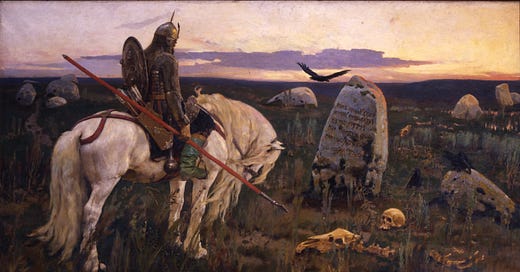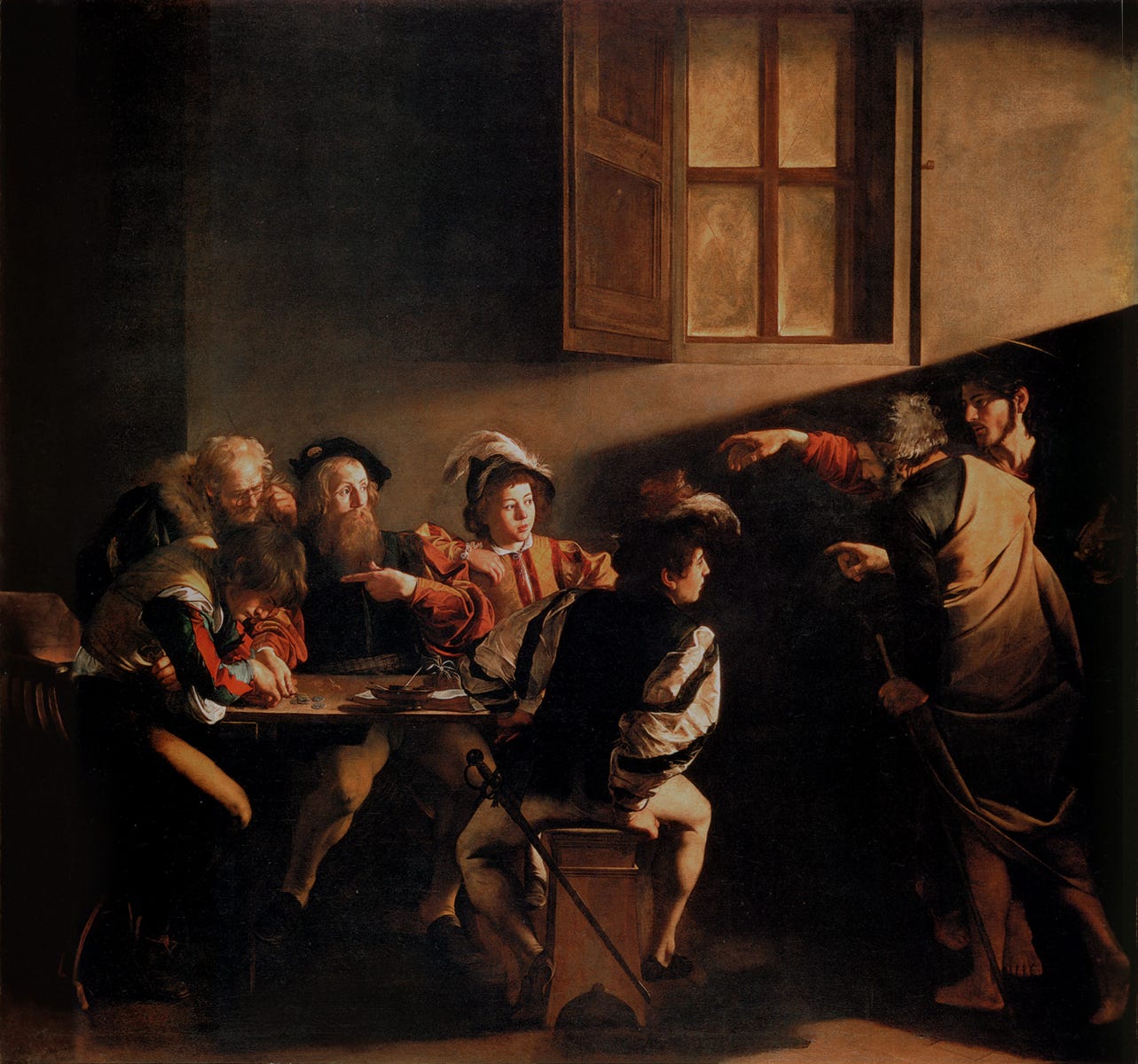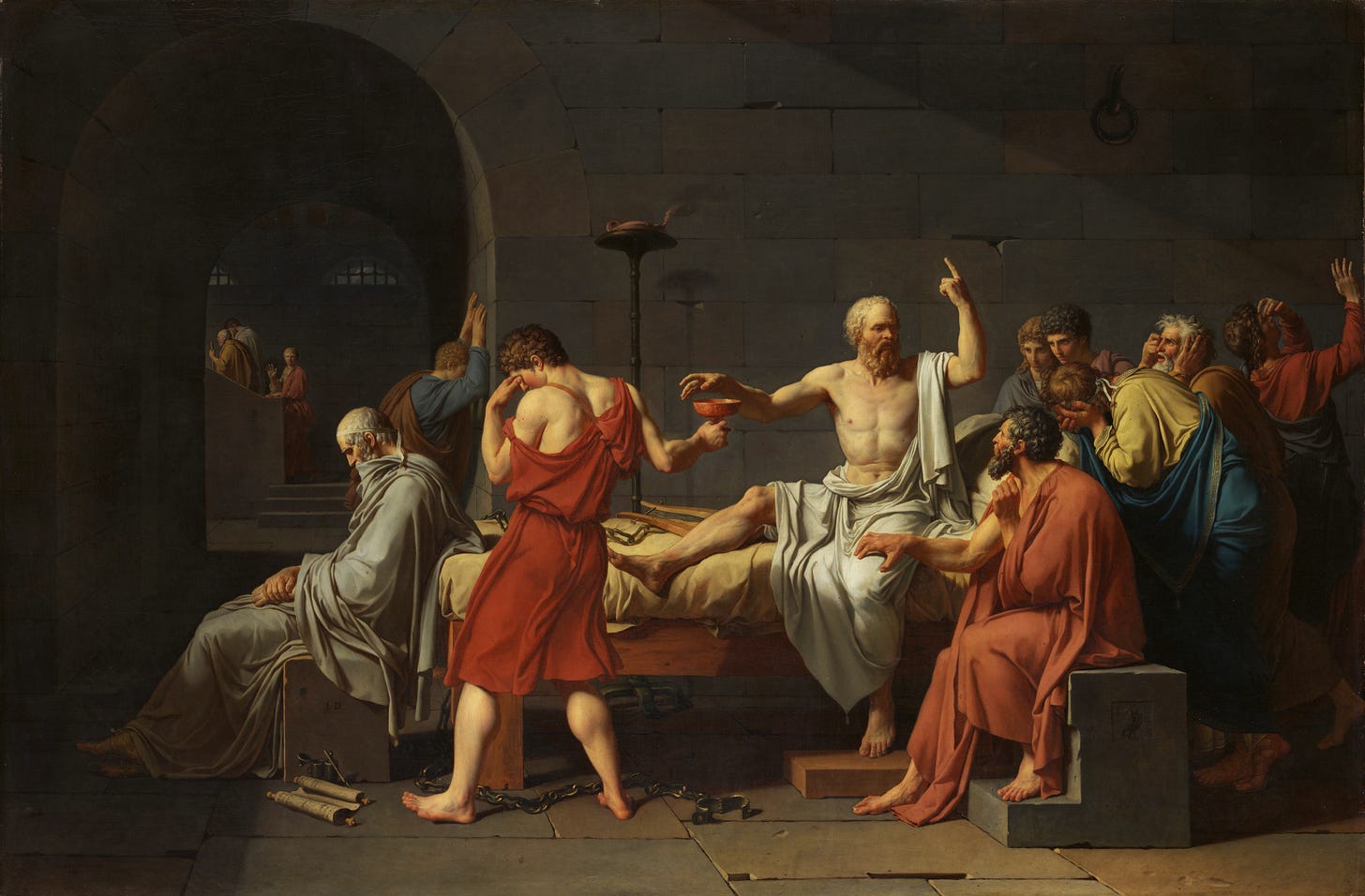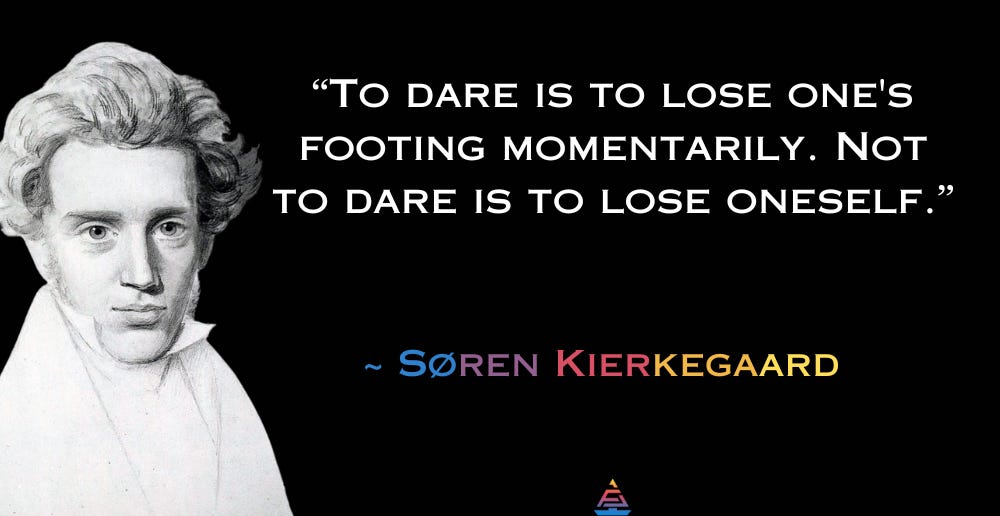Death at the Crossroads
Abraham's Calling, a Cup of Hemlock, and the Little Deaths That Define Us
At the precipice of diverging paths, giving pause is instinct. A heaviness rests at the next step. One path preserves comfort, the other demands adventure. With each choice, the next crossroads asks more from you: greater sacrifice, more trust.
The decision's difficulty matches its potential promise. Each path's horizon offers a vision of who you might become.
The path of comfort keeps behaviors and life patterns stable, even harmful ones. This route can create stagnant drudging, though, at times, the negative and old patterns aren't ready to be burnt off yet.
The call to adventure is a new path that confronts you with an unfamiliar challenge. This path speaks to the truth about your destiny but risks the stability and safety of your current life.
I find myself trying to offset risk, and while I've always wanted to commit to the path of adventure, I worry about the practical implication—my greatest flaw at the crossroads, frozen by indecision due to analysis while I risk becoming bitter from not taking a leap of faith into adventure. But if I were to read a story about myself, the path of adventure and truth would be the exciting and worthwhile one.
This piece felt like it was born out of me, not only because I'm ready to take one of my biggest leaps but because I'm ready to be someone who lives for taking those leaps.
At life's crossroads, to heed the path which beckons adventure—to embrace the unknown and take a leap of faith—is how we live in truth and forge legacies that outlive us. The sacrifices demanded by the adventure seem to adhere to a divine law: the deeper the surrender, the greater the reward.
This tension between safety and adventure is ancient and is written into every great story of those who decided to leap.
Take the biblical story of Abram, later Abraham. Abram, an elderly man living a comfortable life alongside his relatives in his father's home, is called upon by God to take to adventure, "Go from your country, your people and your father's household to the land I will show you."
He's confronted with two choices: Stay in the warmth of the known? Or step into the cold uncertainty of the call?
Abram leaves, and despite moral failings along the way, as every individual contends with, he matures into the father of nations. A transformation so radical that the adventure makes him almost unrecognizable from his original being. First, he is weak, unable, and in the comfort of his parents' home. Later, so radically transformed, even his name changes from Abram (means: high father) to Abraham (means father of nations/multitude).
What about that calling still resonates today?
I suspect many will think, 'God doesn't visit me with adventures. Where is His presence in modern day?'
To which my favorite response is channeled from none other than Jung,
"A fine old story about a student that came to a rabbi: "In the olden days there were men who saw the face of God. Why don't they anymore?" The rabbi replied, "Because nowadays no one can stoop so low."
We might imagine our ancestors' associating dreams, voices heard, and feelings with the phenomenon that is God. They leaned more heavily on faith or ritual, while today, we often default to rational analysis—though both modes have always coexisted.
When moderns face a decision, it's "break out the pros and cons list!" When our ancestors faced a decision, "bust out the bible and pray on it!"
I think that an analytical approach should be used to find a way to materialize your calling rather than rationalize it away. In essence, making the calling superordinate to the analysis.
We must ask ourselves: how should we conceptualize the spirit which calls us forward?
God as calling and conscience is one of my favorite ways of conceptualizing Him. That calling, in my experience at least, comes in the form of curiosity, interests, and a feeling of a pull in a specific direction. It's conscience speaking to you; the voice in your head or the feeling that assists you on your journey.
Socrates described a 'daimonion'—a divine voice or inner sign—that would 'speak up,' and warn him against poor decisions. If it said nothing, it meant that his decision was okay. A similar process to how I've fostered my authenticity.
The nature of the daimonion is debated. I interpret it akin to what we call conscience: a guiding voice urging us toward truth. That guidance also serves as a calling; it pulls us down unknown pathways that grab our interest, emulating a personal truth.
His belief in his daimonion led to part of the charges leveled against him by three Athenians (Meletus, Anytus, and Lycon). Socrates was accused of corrupting the youth and impiety (irreverence to the state gods due to belief in his daimonion).
The trial followed Athenian procedure: accusers spoke, Socrates defended himself, the accusers rebutted, a 501-citizen jury voted on guilt, and—after conviction—both sides proposed punishments (e.g., death vs. a fine), with the jury selecting the penalty.
Socrates' trial, which can be read in Plato's Apology1, is as inspiring as it is entertaining.
He spoke his truth, standing firmly in his case. He did not bend to wrongful accusations and the tyranny of the mob, even in the face of death. After being voted guilty, Socrates even joked about getting free meals for life as his punishment.
He had the ability to suggest exile as a punishment2—to pack up and leave—and he stood firmly by his guiding spirit,
"Someone will say: Yes, Socrates, but cannot you hold your tongue, and then you may go into a foreign city, and no one will interfere with you? Now I have great difficulty in making you understand my answer to this. For if I tell you that this would be a disobedience to a divine command, and therefore that I cannot hold my tongue, you will not believe that I am serious…"
His alternative suggestion was a monetary fine, to which the jury voted death by hemlock.
While awaiting execution, he even had the chance to escape, as is made clear in his dialogue with his friend Crito, who even laid out a detailed escape plan3. Still, Socrates stood firm in his principles.
This was Socrates' final crossroads.
I'll never forget the insufferable philosophy PhD student professor in one of my senior year philosophy classes scoffing with contempt, "Socrates was an idiot."
This was the same professor who, with apocalyptic fervor, started classes with a warning that civilization would collapse within 15 years unless we 'fought the capitalist,' and 'saved the bees.' His parting words to us were, "remember to fight the evil billionaires!" So… yea… definitely had the intellectual edge on Socrates.
Annoying as that professor was, a necessary question arises for anyone who looks at the surface of that situation and wishes to go a bit deeper.
Why did Socrates choose death over exile?
Socrates, who dedicated his life's mission to the pursuit of wisdom and truth, saw that the path of truth led him to his literal death. Quite the fork in the road, huh?
For him, he knew that the alternatives would mean betraying himself, which living with would have been worse than death itself. The importance of the honest path was the foundation of his life.
I can see the counter position, too; this can be viewed as a reckless decision. "Just get the hell out of there, and tell the truth elsewhere," one might argue.
This passage from his legal defense helps allude to an answer:
"If you say to me, Socrates, this time we will not mind Anytus, and will let you off, but upon one condition, that are to inquire and speculate in this way any more, and that if you are caught doing this again you shall die; - if this was the condition on which you let me go, I should reply: Men of Athens, I honor and love you; but I shall obey God rather than you…"
Ultimately, the pattern of behavior that pushed him to align with truth and the continual pursuit of self-knowledge also led him to death. The profound wisdom Socrates passed on through countless generations over millennia was evident in everything he did, and he chose to walk that path no matter what sacrifice was required on the other side.
Conscience and calling enlighten a path forward that is true to your being. It's the guide for us to walk the path toward the ultimate good as we continue to strive to choose greater adventures.
So, what should you do when the conscience and the calling want you to walk a path that puts everything at risk for something far more interesting, adventurous, and truthful? My default answer is always: choose adventure.
When you keep choosing adventure, you are sacrificing something of importance on the other path, but that sacrifice begets better and bigger rewards on the path to adventure. This is an insistence present throughout the biblical narrative:
"Most assuredly, I say to you, unless a grain of wheat falls into the ground and dies, it remains alone; but if it dies, it produces much grain."
John 12:24
In the short term, the sacrifice might be difficult. It certainly must have been difficult for Abraham, an old man in the comfort of his father's home, to leave and have a difficult adventure. And it must have been difficult for Socrates to stand his ground in front of a 501 jury of his peers to speak for what he believed to be correct regardless of the majority thinking he was not.
For Abraham, the first sacrifice was leaving the comfort of his father's tent—a surrender of familiarity for the uncertainty of divine calling. Each crossroads afterward demanded greater trust, culminating in the unthinkable test of sacrificing his son. Yet each step deepened his faith, transforming him from a wanderer into a formidable leader who was continually granted gifts by the universe.
In Socrates' case, the path of truth and adventure led to the sacrifice of his life.
What does this tell us?
At the crossroads, the path of truth and adventure will be difficult and will require sacrifice. But you will become wiser and stronger and will be granted great rewards for it. In the story of Abraham, this is made clear. In the case of Socrates, it's a question we won't know the answer to, but I'd like to think that his persisting legacy of the pursuit of truth alone speaks to the greatness of what was granted to him—and what he granted us.
When you are on the cusp of deciding, the leap in the direction of adventure should not be made lightly. You must be ready to make a sacrifice of the greatest value in relation to the adventure.
I stand at the brink of my greatest crossroads yet: the leap to pursue The Frontier Letter full-time. I’ve mapped the terrain, stocked my provisions, excavated my psyche, and reinforced my spirit—yet the old ghost of inadequacy still whispers: What if you’re not enough?
I've stood at enough crossroads now—chosen truth often enough—to trust that even if I fall, the fall itself will plant seeds. The path of adventure requires a leap of faith, and despite the fears and short-term struggles, the best parts of me resonate in this direction.
I will choose adventure.
I hope to continue to become someone defined by the path of adventure.
And I hope that one day, when I face my final crossroads, I unflinchingly choose adventure.
For my future self and anyone else who needs to hear this: take your leap.
Until next time,
Take care of yourself, everyone.
Dom
Here's a free audiobook version on YouTube. It's only about an hour long.
It seems implied in Plato's Apology that Socrates could have chosen exile and that it would have been voted for by the Athenians.
“Crito: Fear not. There are persons who at no great cost are willing to save you and bring you out of prison; and as for the informers, you may observe that they are far from being exorbitant in their demands; a little money will satisfy them. My means, which, as I am sure, are ample, are at your service, and if you have a scruple about spending all mine, here are strangers who will give you the use of theirs; and one of them, Simmias the Theban, has brought a sum of money for this very purpose; and Cebes and many others are willing to spend their money too. I say, therefore, do not on that account hesitate about making your escape, and do not say, as you did in the court, that you will have a difficulty in knowing what to do with yourself if you escape. For men will love you in other places to which you may go, and not in Athens only; there are friends of mine in Thessaly, if you like to go to them, who will value and protect you, and no Thessalian will give you any trouble.”








